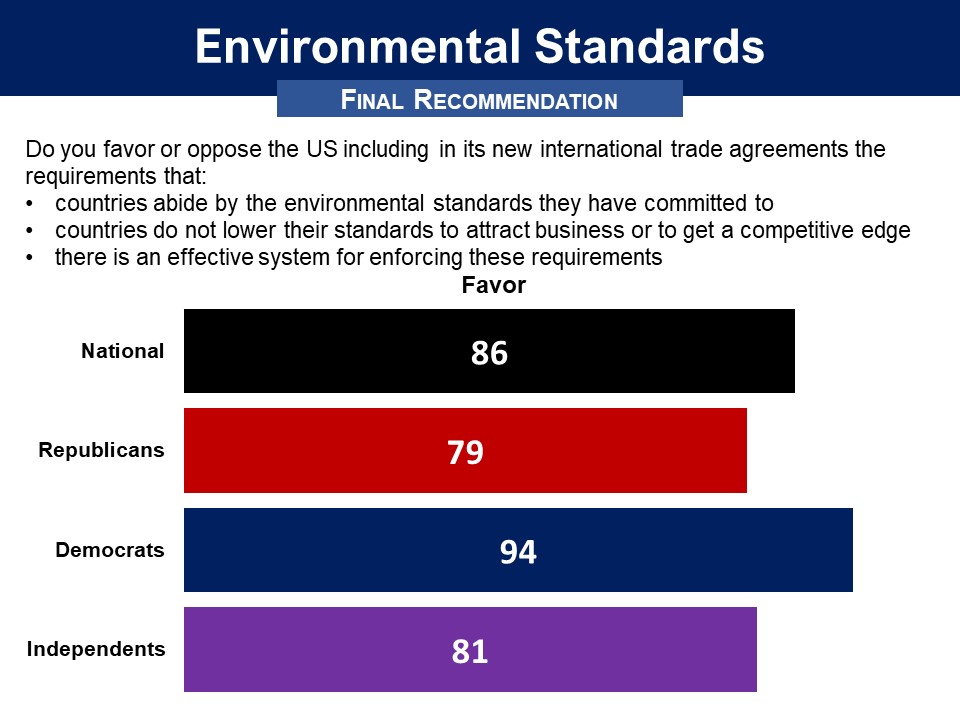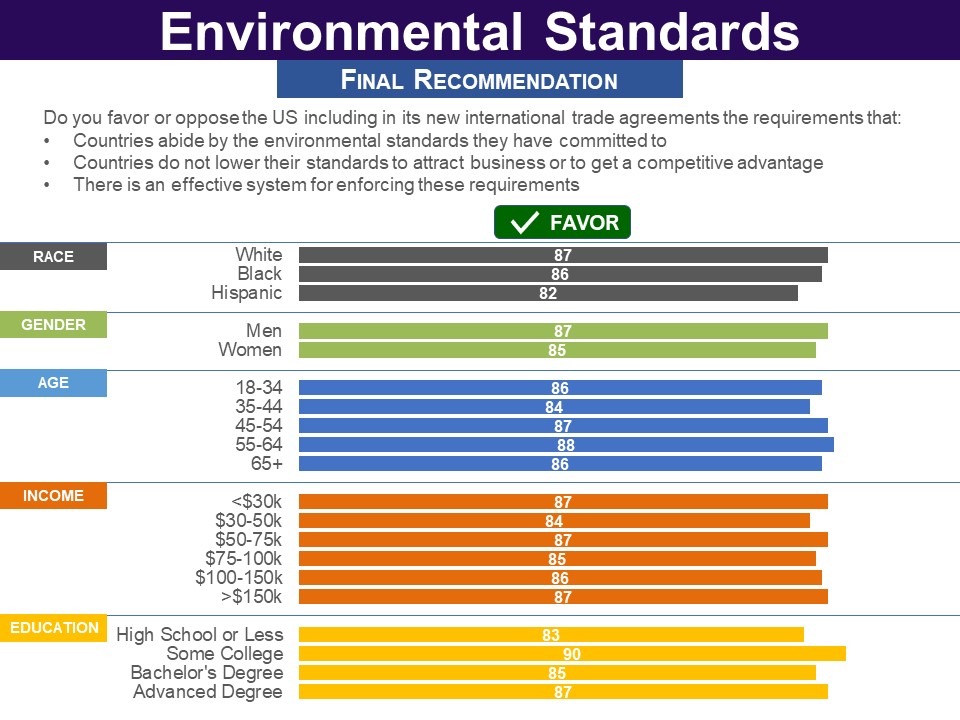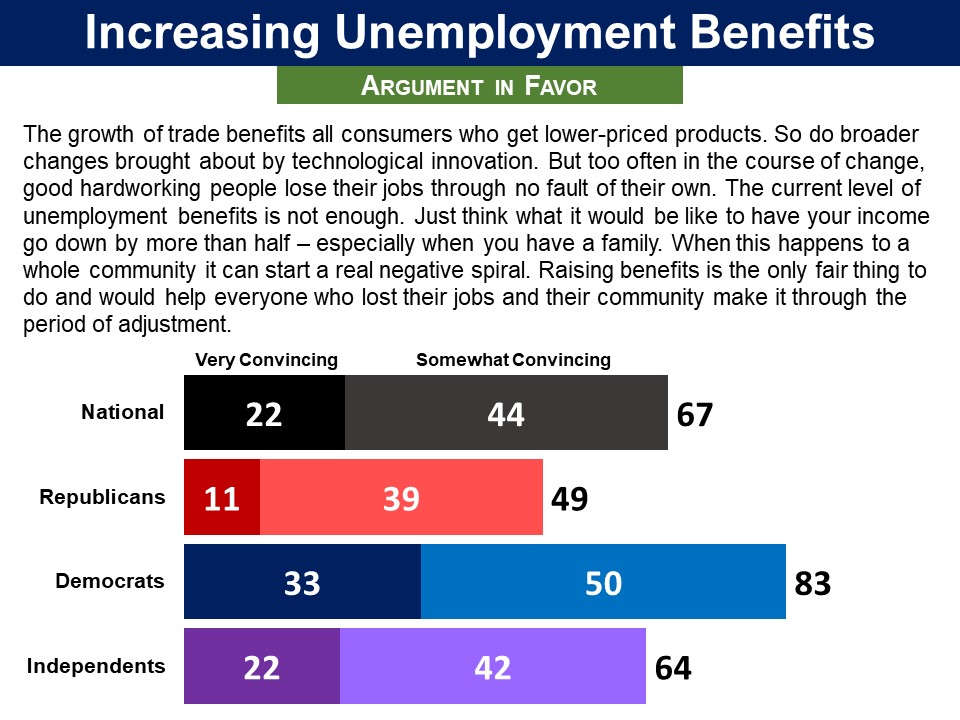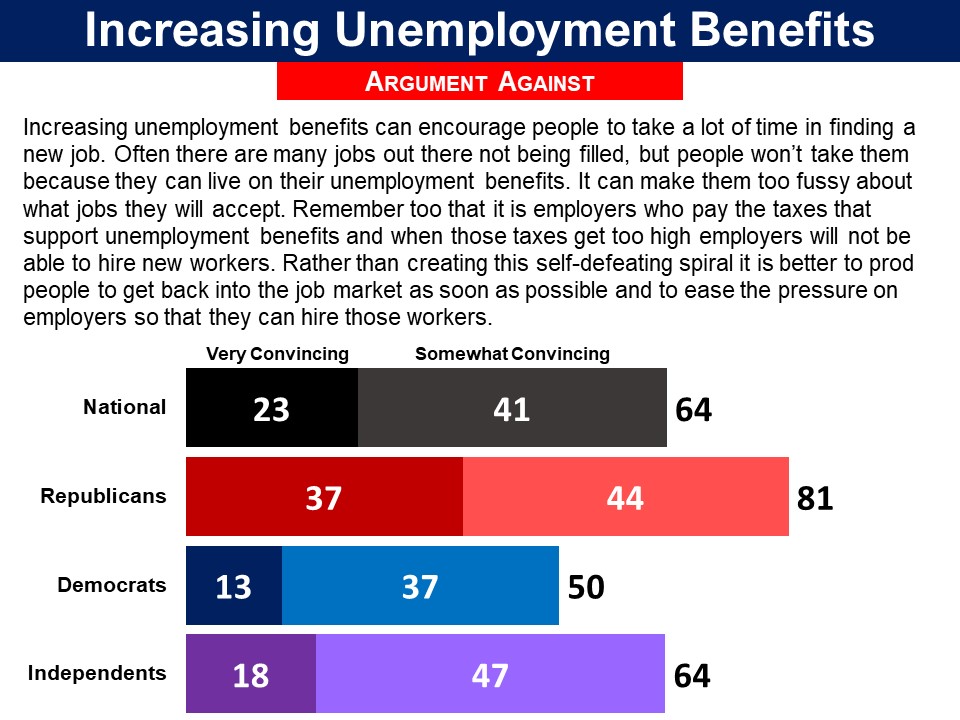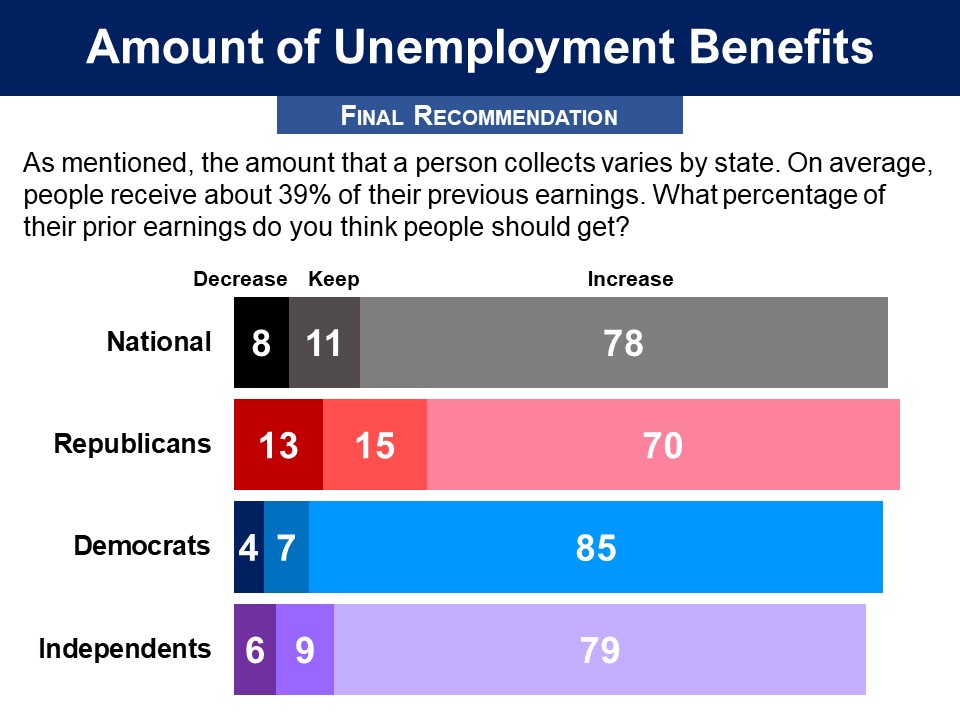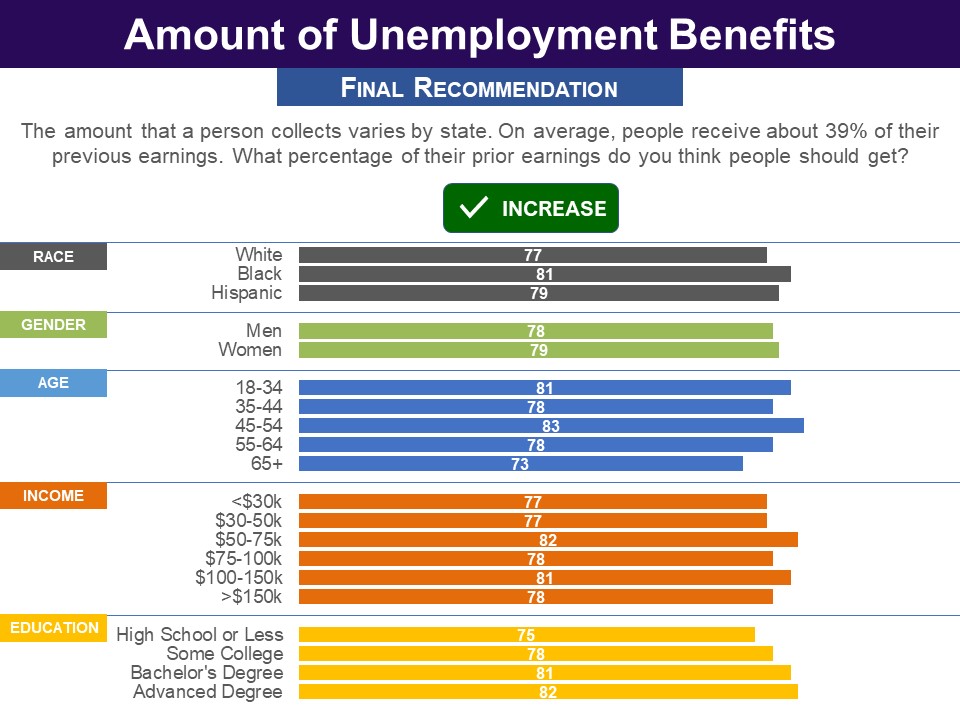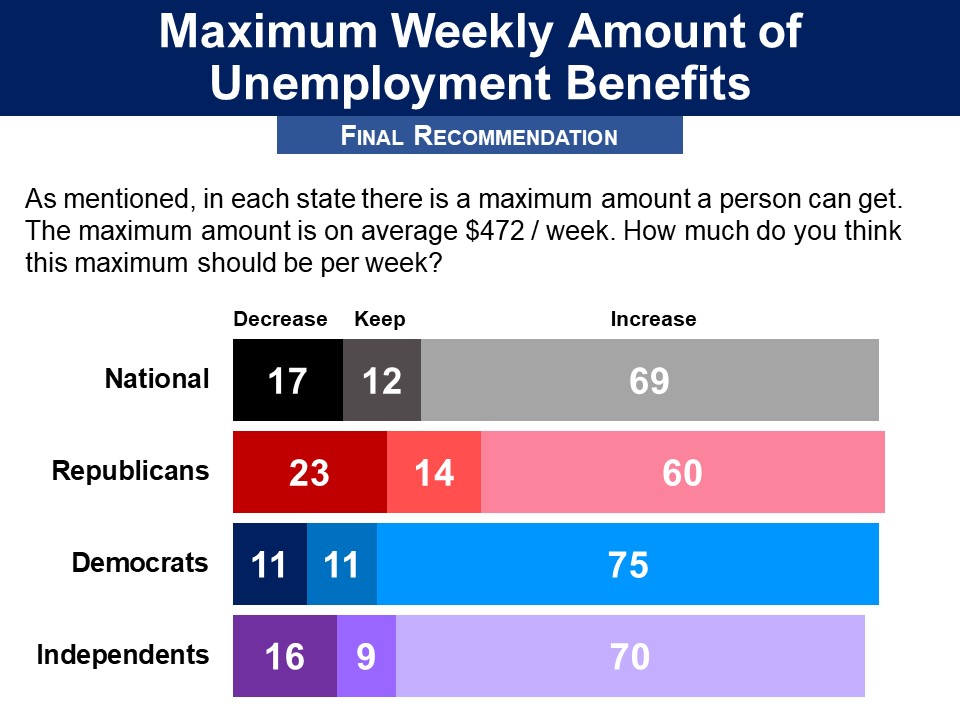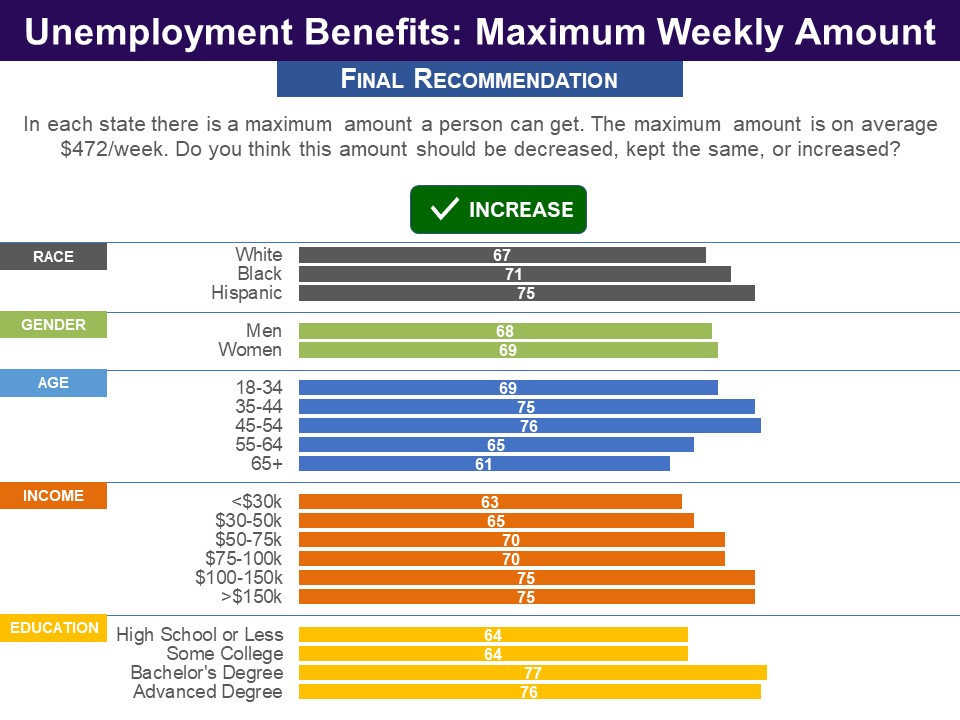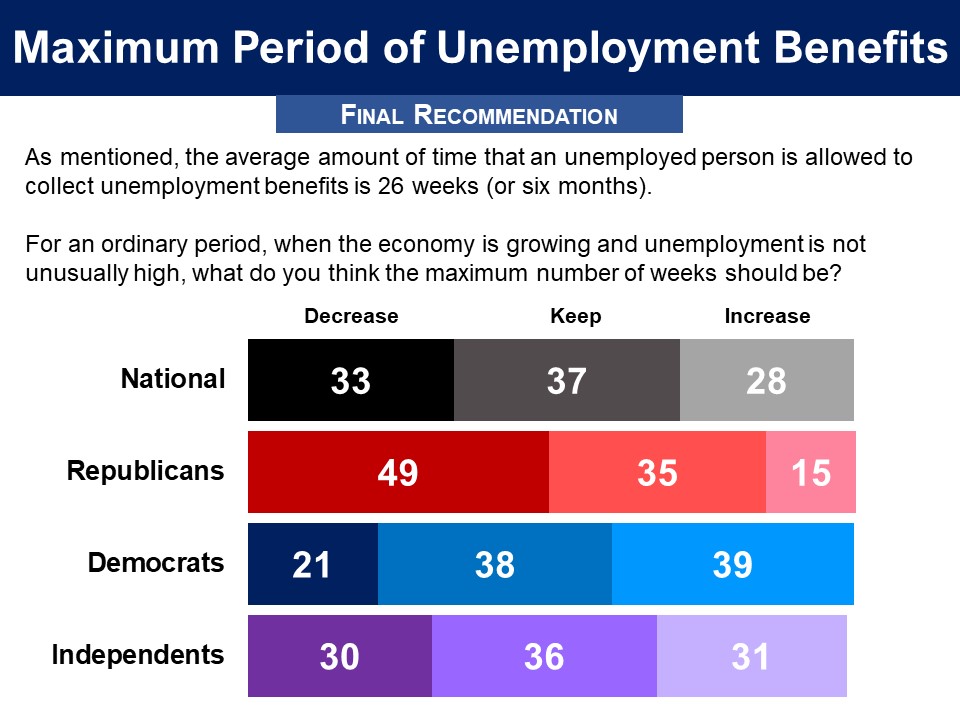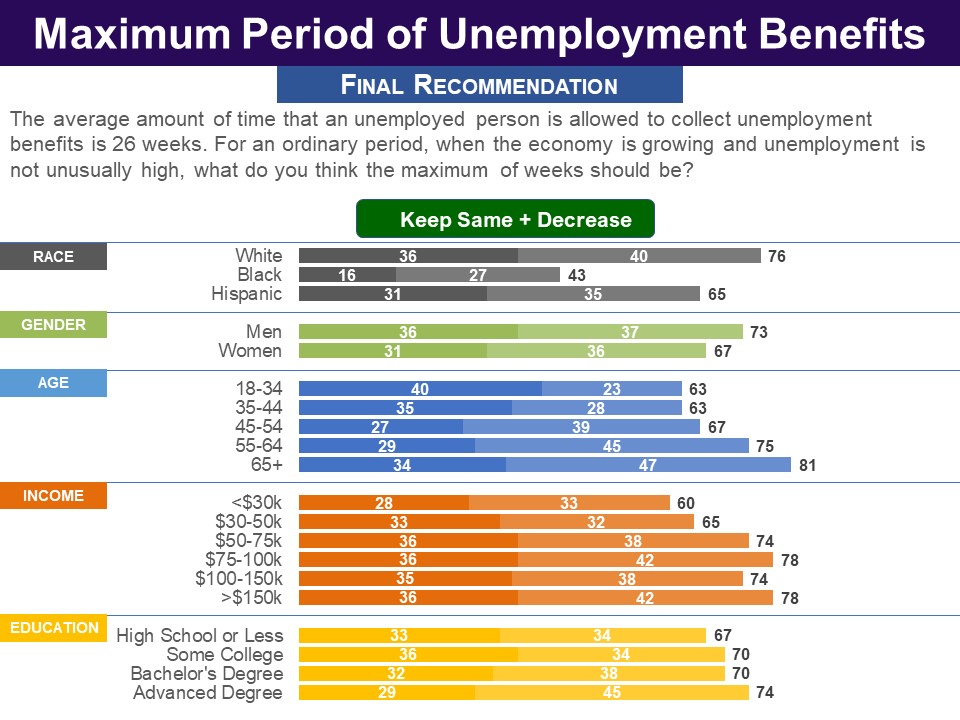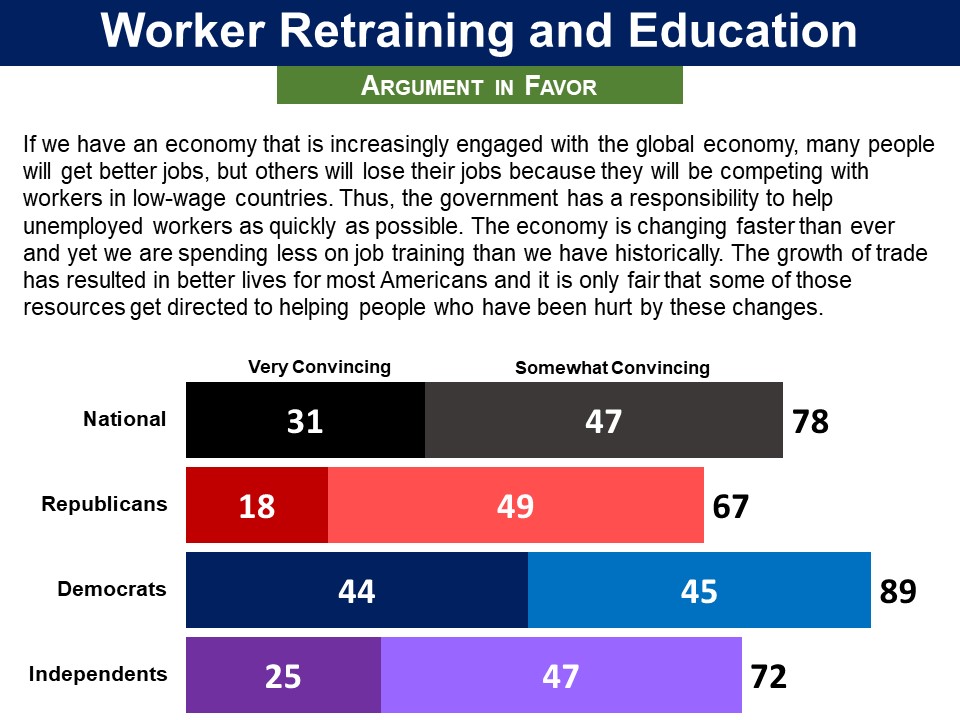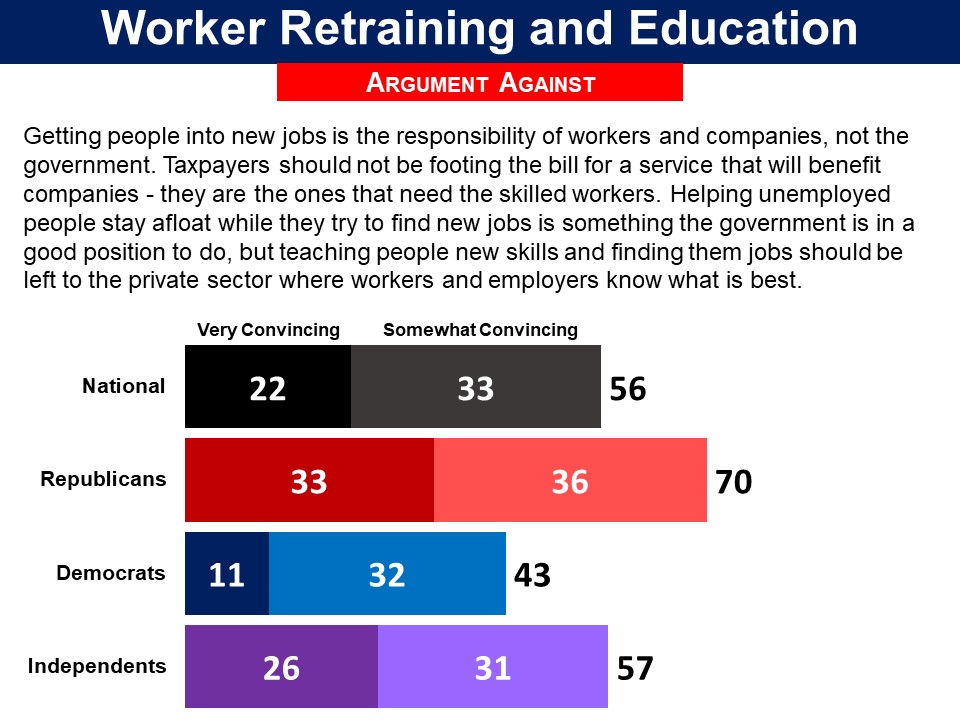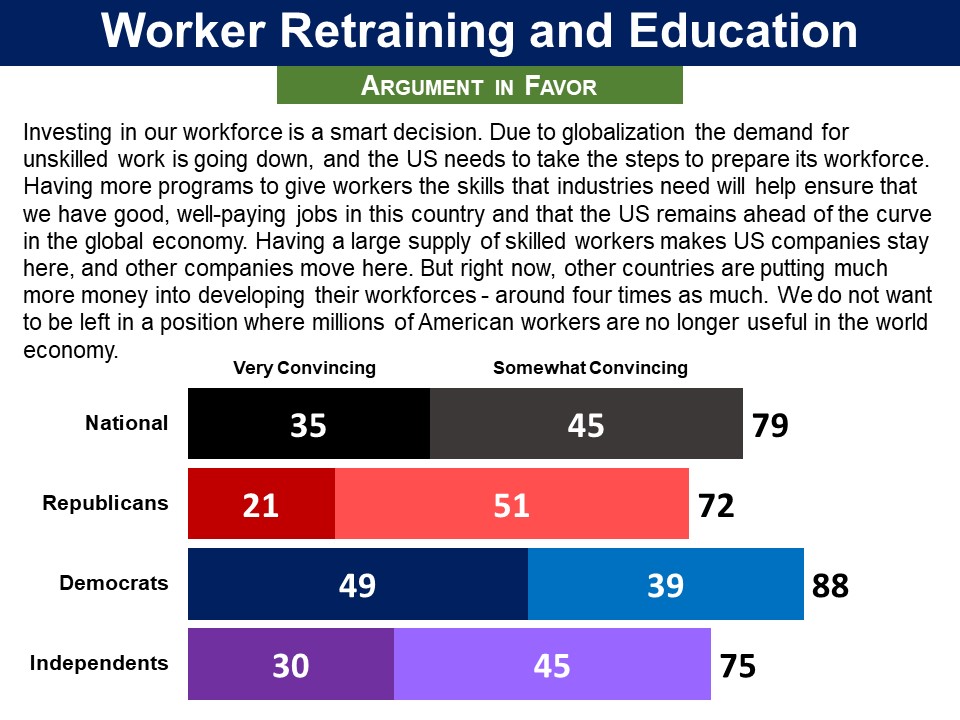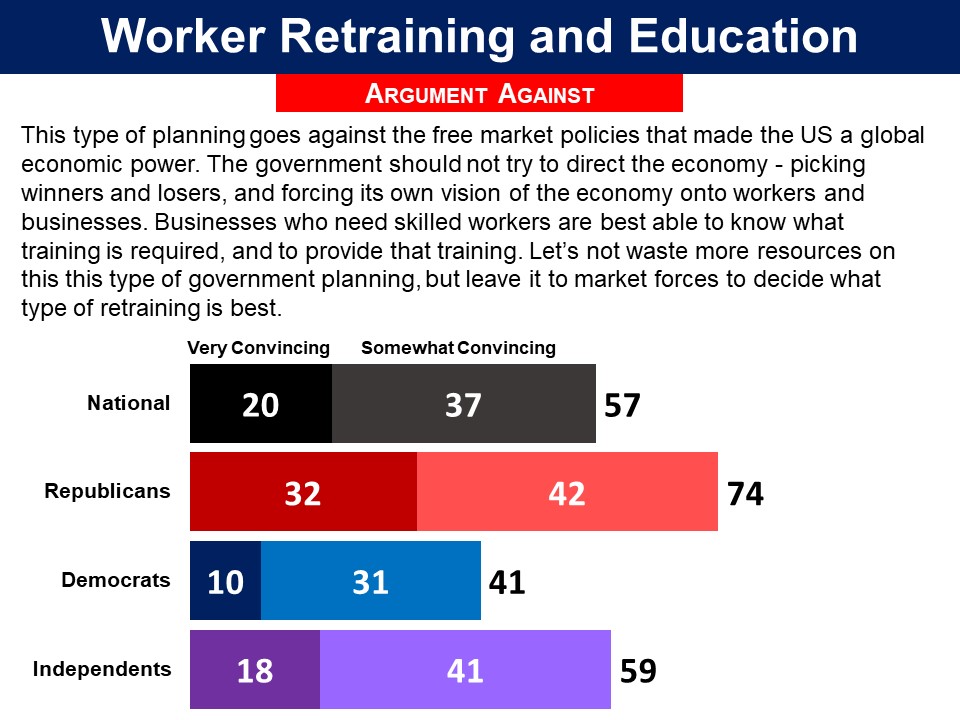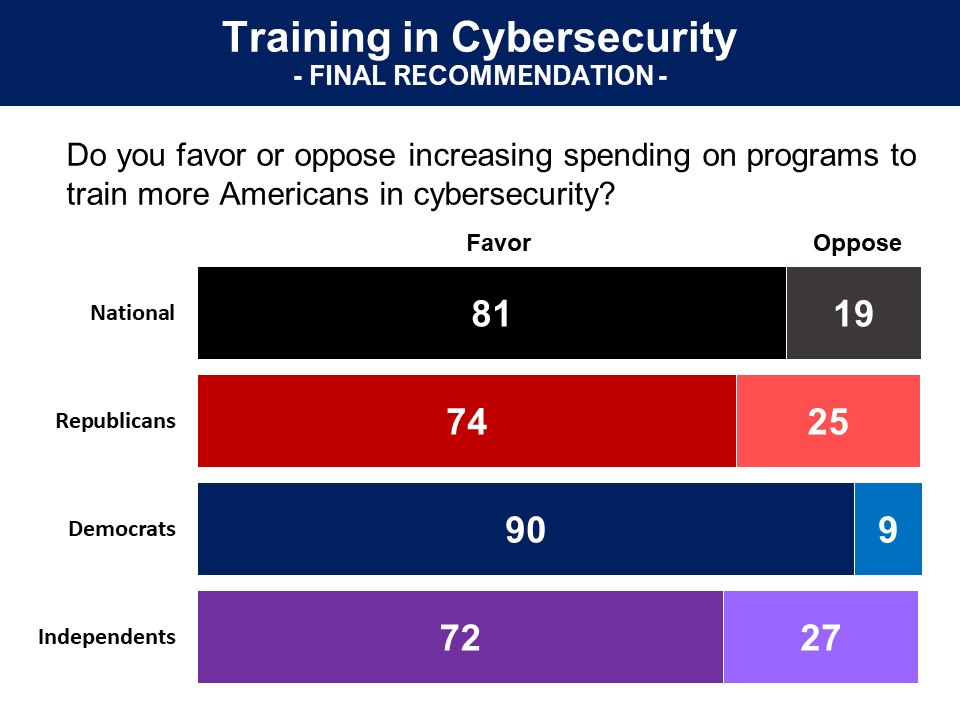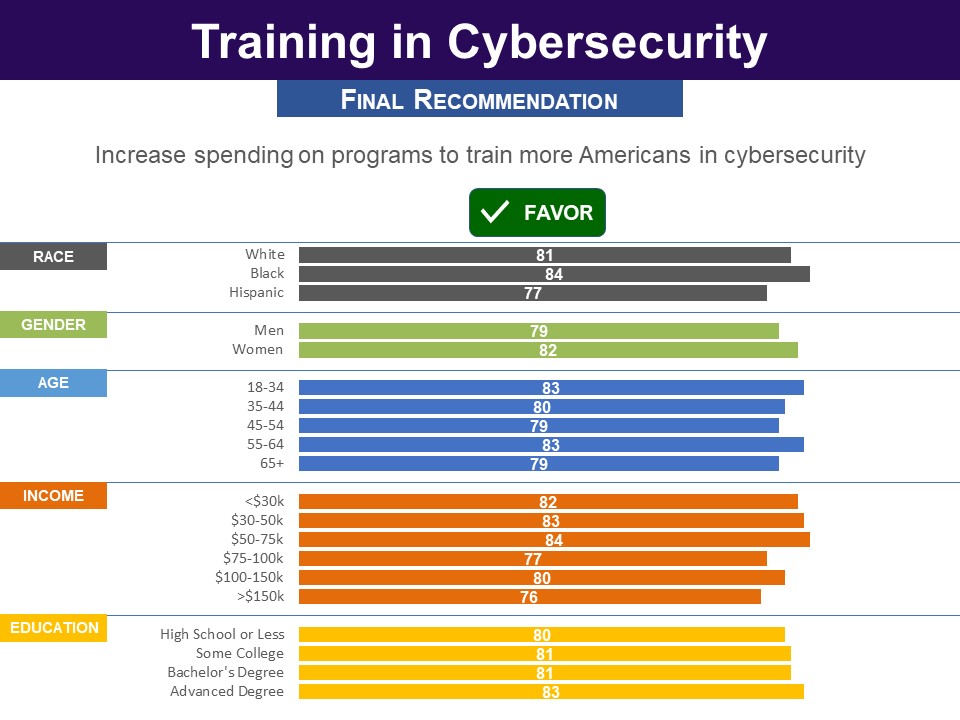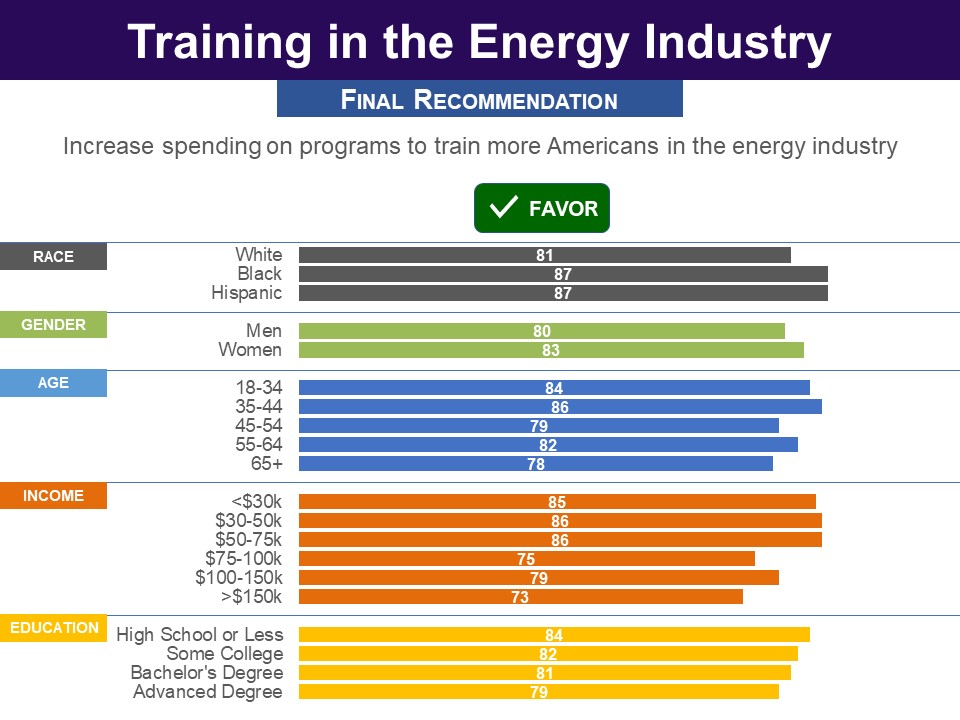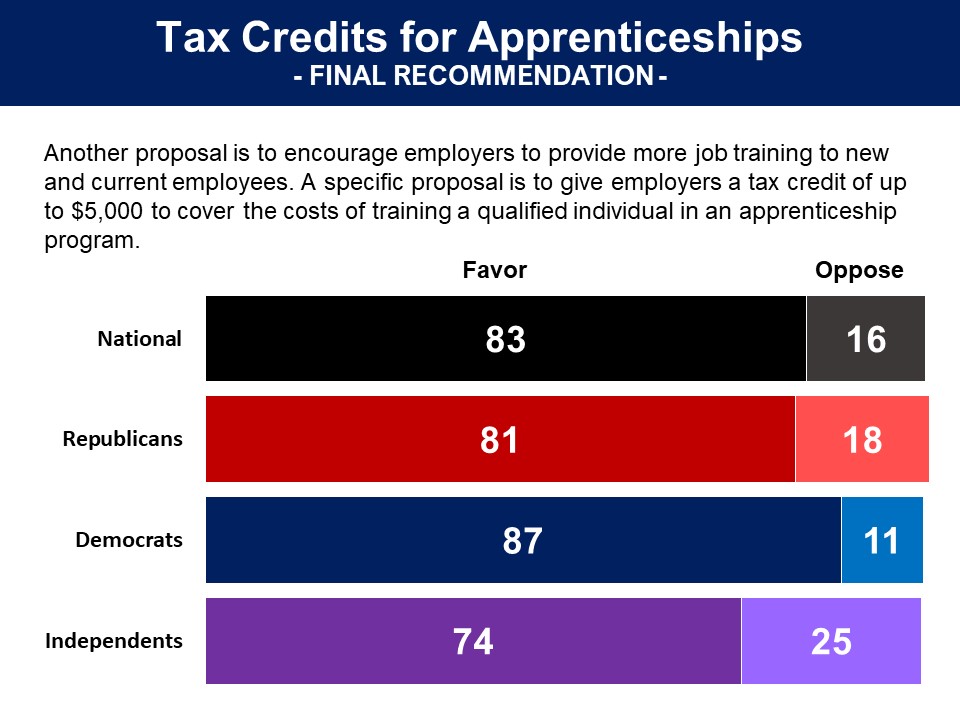
International Trade
International trade has been controversial for some decades. Each international trade agreement has been preceded by a major debate about whether the benefits of trade outweigh the costs, particularly for American workers.
- National Sample: 2,993
- Margin of Error: +/- 1.8%
- Fielded: April 10 - May 13, 2019
- Questionnaire
- Report
Proposals with bipartisan support discussed below:
- The US continuing to promote international trade through a set of internationally agreed-on rules
- Continuing to be part of the World Trade Organization
- Continuing to be part of NAFTA
- Including enforceable labor and/or environmental standards in new free trade agreements
- Increasing the amount of unemployment benefits a person can receive, as a percent of prior earnings
- Increasing the maximum amount of unemployment benefits a person can receive
- Increasing the maximum number of weeks a person can receive unemployment benefits
- Providing employers with a tax credit to provide apprenticeships
- Spending money on education and job training in the cybersecurity sector
- Spending money on education and job training in the energy sector
Proposals with bipartisan support that were passed into law:
- Congress voted in favor of the US-Mexico-Canada Agreement (USMCA)
Proposals that did not have bipartisan majority support:
- Expanding TAA to more people who get laid off from their job directly because of an increase in trade
- The US invoking the national security exemption to impose tariffs of 25% on steel imports and 10% on aluminum imports
- Imposing additional tariffs on China or continuing to work through the WTO to get a ruling against China
|
HAVING INTERNATIONAL TRADE AGREEMENTS |
|
To introduce respondents to the general topic international agreements they were first given a briefing on how in the post-World War II period the US and other countries established “a number of international agreements and institutions” to address a variety of objectives, among them to “promote international trade.” Going deeper into the objective of promoting international trade, they were told that the US and other countries pursued this objective “by agreeing on a set of rules that seek to lower barriers to trade and ensure trade is done fairly.” They were then informed:
They were asked how familiar they were with the idea of promoting international trade through such agreed-upon rules. The majority of respondents reported being familiar (very 16%, somewhat 50%), with no significant differences between Democrats and Republicans. The briefing then turned to the creation of regional trade agreements, explaining that the US has many of these agreements, with the North American Free Trade Agreement being the most well-known (the USMCA had not yet passed). . They were told that there is a debate about the broader question of whether or not the US should continue to seek to further the growth of international trade through international agreements. They were presented a series of pro and con arguments and asked how convincing they found each one. As we will see both pro and con arguments were found convincing by large majorities. General Economic Growth and Unequal Costs/Benefits
The Impact on Jobs Effect on Poverty Around the World
It is worth noting that support was so high though the arguments against the promotion of trade did very well and the arguments in favor were found convincing by less than the number who finally approved. This suggests the process of deliberation has a positive effect on views of trade, even when counter arguments are included. There were no substantial demographic variations. Even among those with education of high school or less, approval was 86%, though those with an advanced degree were slightly higher at 92%. Age variations were slight, though the support among those in the 35-44 range were a bit lower (82%) than for either 18-34 (87%) or over 65 (93%).
Related Standard Polls
When offered the option of expressing ambivalent feelings about free trade agreements, large numbers have selected that option, sometimes even a plurality. The number who express positive views have far outweighed those with negative views:
Large majorities -- bipartisan up until recently -- have supported specific free trade agreements with Europe and among the Pacific nations:
When respondents have been given the opportunity to express support for free trade agreement coupled with programs to mitigate the effects on American workers, a clear majority has favored them:
Framed as a question about protecting American jobs or creating American jobs, a large bipartisan majority has favored increasing exports over restricting imports:
However, when the question has been framed as protecting American jobs or helping US consumers, a majority has favored restrictions:
|
|
As a follow on to the series of pro and con arguments on free trade agreement, above, respondents were asked about a free trade agreement with Mexico and Canada. At the time (May 2019) there was a debate about whether the US should continue to be part of the North American Free Trade Agreement (NAFTA) that was established in 1994. Respondents were reminded about the history of NAFTA: As you may recall, the US, Mexico and Canada have had a free trade agreement since 1994 called the North American Free Trade Agreement or NAFTA. It lowered or eliminated tariffs on most products sold between the three countries, increasing the amount of trade. They were then asked whether they favored or opposed the US continuing to be in the agreement. A bipartisan majority favored it (72%), including 55% of Republicans as well as 88% of Democrats.
In the same survey respondents were asked about the proposed revisions to NAFTA, including a renaming of the agreements as the United States, Canada, Mexico Agreement (USMCA), and a list of provisions related to auto parts, hourly rates for autoworkers, prescription drugs, dairy products, e-commerce and more. Respondents evaluated arguments for and against these changes. The arguments in favor did slightly better overall than those against. Finally, asked what their representatives in Congress should do in regard to USMCA, a bare majority of 53% said they should vote for it, including a robust 64% of Republicans. Thus with the changes to the free trade agreement with Mexico and Canada with the UMCA legislation, Republican support grew stronger. Democrats, however, came down against the USMCA legislation, with a modest majority (54% opposed). However the Democrats response to the pro and con arguments make it clear that their opposition to the USMCA legislation was driven by their support for greater free trade with Mexico and Canada, not opposition. The argument against the USMCA based on the negative effects of free trade with Canada and Mexico was rejected by a majority, while the argument that it compromises free trade principles was found convincing by a large majority.
But a few months later a very large majority of Democrats confirmed their support for a North American free trade agreement by effectively saying that, even with the new changes, the agreement will be good for the United States.
|
|
Ever since the US took the lead in creating the World Trade Organization (WTO) in 1995, there has been a concern over whether US membership is beneficial. Respondents were presented the history of how the General Agreement on Trade and Tariffs (GATT) was established and later led to the establishment of the World Trade Organization to facilitate negotiation of trade rules and especially to deal with disputes. The procedure for dealing with disputes was described. A brief recap of the US experience with WTO dispute resolution process was provided, showing the US win-loss record as similar to that of other countries. They then heard arguments for and against the US continuing to be part of the WTO. The argument in favor was found convincing by a majority overall, and among Republicans and Democrats. The counter argument was found convincing by far fewer—only 52%—with a significant partisan divide: 70% of Republicans found this argument convincing, which is more than with the argument in favor, and only 34% of Democrats did. |
|
Respondents were presented with the following briefing material as part of an in-person deliberation by Stanford University’s Center for Deliberative Democracy in September 2019: Under the Obama administration, the US negotiated two large trade agreements — the Trans-Pacific Partnership (with Canada, Mexico, Japan, South Korea, Vietnam, Australia, and others) and the Transatlantic Trade and Investment Partnership (with the European Union). These deals would have further reduced tariffs on trade and increased protections for workers, the environment, and US intellectual property abroad. However, President Trump withdrew from these agreements before Congress could ratify them, leaving both deals in limbo. Critics of global free trade say American manufacturing jobs have been lost in these deals. Wages are lower in places like Mexico, China, India, and Vietnam, and these countries also have weaker labor and environmental standards than the US. American consumers gain, as they can purchase many foreign-made goods at much lower prices than they could if these goods were produced in the US. Some say, pointing to America’s growing trade deficits, that NAFTA and trade with China has cost millions of jobs in the US. However, others say that automation better explains America’s steady or increasing manufacturing output despite fewer manufacturing jobs. In other words, the US actually manufactures more now, but does so despite employing people. They were then presented a proposal and arguments for and against it, as follows: Proposal: The US should rejoin the Trans-Pacific Partnership (TPP), a trading arrangement between 12 countries, but not China. Argument in Favor: The TPP will help encourage its members to look to the US, rather than China, for leadership on trade, worker protection, and environmental control. It will also make US goods more competitive, creating more jobs and lower prices for consumer goods. Argument Against: The TPP does more to protect big business than workers or the environment. It will encourage companies to move manufacturing out of the US. After receiving the briefing material, respondents deliberated on the proposals in-person. Finally, they were asked for their final recommendation. On a 0-10 scale, 74% favored the proposal (6-10), including 62% of Republicans and 88% of Democrats. Related Standard Poll
|
|
PROHIBITIONS ON TRADE |
|
The US routinely sells oil from its Strategic Petroleum Reserve to companies through a bidding process, and some of these companies are directly owned or controlled by the governments of foreign adversaries, which include Russia, China, Iran, Cuba and North Korea. Members of Congress opposed to providing oil from US reserves to companies from these nations have introduced legislation to prohibit such sales. Respondents were to briefed on this issue as follows: As you may know, the US has a large reserve of oil called the Strategic Petroleum Reserve. At times, the U.S. government adds to it while at other times it sells some of the oil. There is a debate about who the U.S. should sell the oil to. First, here is some background information about the Strategic Petroleum Reserve: In 1975, Congress passed a law that enabled the U.S. federal government to buy and hold a certain amount of oil in case events disrupt the supply of oil and could cause increases to its price. When there is such an emergency, the White House can sell oil from the reserve. It is required by law to sell at the market price to the highest bidder. But, by providing more supply to the market it helps bring the price down or prevents it from going up. When the government sells oil from the reserve, it simply sells it into the general oil market so anyone can buy it. Currently there is a debate about whether the U.S. should restrict who can purchase oil from the reserves. They were then introduced to the proposal: There is a proposal to prohibit selling oil to corporations from countries that are adversaries to the U.S. (China, Russia, Iran, North Korea and Cuba.) Most of these corporations are directly owned or controlled by their governments. When the U.S. has sold oil out of the reserve a small amount–a few percent– have been sold to corporations from China and a smaller amount to Russia. The arguments in favor were found convincing by bipartisan majorities, while the arguments against were found convincing by less than half.
A more narrow bill which would prohibit US oil reserves sales to China only was introduced in the Protecting America’s Strategic Petroleum Reserve from China Act by Rep. McMorris (D) (H.R. 22) and Sen. Cruz (R) (S. 218). This bill passed the House 331 to 97, but has not yet been taken up by the Senate. |
|
There has been concern among some Members of Congress of the increasing purchase of US farmland and real estate to companies affiliated with foreign adversaries. Legislation was introduced to prohibit such sales. Respondents were briefed on this issue as follows: This survey is going to look at policies that restrict the sale of certain U.S. assets (businesses, technology, land and real estate) to corporations and individuals, who are foreign (i.e. not American). As you may know, the Executive Branch has the power to review and stop major purchases by foreign entities of US technology and businesses if they believe that the sale would be a threat to national security (such as materials and technology used by the military, or the energy sector). When it comes to land and real estate, the Executive Branch can also stop the sale to a foreign entity of land or real estate, but only if the Department of Defense believes it is critical to national security, such as land next to military bases, and air or sea ports. Blocking sales of property if the purchaser is linked to a foreign adversary They were then presented the proposal: There is currently a proposal in Congress that would expand on these policies as follows:
The arguments in favor were all found convincing by large bipartisan majorities, whereas the arguments against were found convincing by less than half. A majority of Democrats only found one con argument convincing: that this new law would be used to target Chinese immigrants and citizens. Respondents were presented another proposal that focused only on the sale of farmland to foreign adversaries: There is another proposal that would require the Executive Branch to review any sale of US farmland to any foreign government, person or corporation to see if it poses a national security risk. If they decide that it does, then the President would be able to stop that sale. Currently, the Executive Branch does this for large sales of US businesses. A bipartisan majority of 80% favored this proposal (Republicans 84%, Democrats 78%, independents 77%). The proposal to require the federal government to review the sale of farmland and block if purchasers are linked to foreign adversaries was introduced in the 118th Congress:
Several bills were also introduced with similar proposals. Blocking the sale of farmland to entities linked to China specifically was introduced in: the Prohibition of Agricultural Land for the People’s Republic of China Act (H.R. 809) by Rep. Newhouse (R), and This Land Is Our Land Act (S. 684) by Sen. Hawley (R). Blocking the sale of farmland if it poses any national security risk, whether or not the purchaser is linked to a foreign adversary, was introduced in the Agricultural Security Risk Review Act (H.R.3378) by Rep. Lucas (D). None of the bills have made it out of committee yet. |
|
|
Prohibit the sale of land or property if purchaser is linked to a foreign adversary |
|
Prohibit the sale of farmland to a foreign entity if it poses a national security risk |
MITIGATING THE NEGATIVE EFFECTS OF TRADE |
|
A major aspect of the debate about international trade deals with the potential for mitigating the negative effects of trade, particularly on American workers and the environment. Proposals for mitigating such effects include having enforceable labor and environmental standards in trade agreements, increasing unemployment benefits to help American who lose their jobs as a result of trade, and working to make Americans more competitive in the global market. |
|
|
Respondents were introduced to the idea that one way to mitigate some of the negative effects of trade is to include, in international trade agreements, the requirements that countries abide by certain labor and environmental standards. This is the briefing they received: As was discussed above, one possible negative effect from international trade is that lowering trade barriers can weaken labor standards or environmental standards. There are two ways that this can occur.
To discourage these things from happening, and to generally raise labor and environmental standards, there have been efforts through the UN to establish international labor and environmental standards. The UN has held a number of conferences on these issues and most countries of the world have agreed to certain international standards. Sometimes, however, countries have signed the UN agreement and established such laws but have not enforced them or later lowered the standards. In other cases, they have not even established the laws. As mentioned, in cases where a country is not abiding by the standards it has agreed to, they may get an advantage because it becomes cheaper to produce certain products.” They were then informed that, “There is some debate about whether the US, in any new international trade agreements, should make it a requirement that countries abide by the standards they have agreed to and do not lower their labor or environmental standards to attract business or to get a competitive edge and to have an effective system for enforcing the standards.” |
|
Turning specifically to labor standards, respondents were given a briefing about labor standards and evaluated whether the US should include them in its new trade agreements, and make them enforceable.
Respondents were informed about the main international labor standards, established by the International Labor Organization, that trade agreements aim to enforce:
They then heard arguments for and against the US including in its new international trade agreements the requirements that:
The argument in favor was found convincing by 85%, including 79% of Republicans and 93% of Democrats. The counter argument was found convincing by just 43%, with neither party having a majority finding it convincing.
Finally, they were then asked whether they favor or oppose including in new international trade agreements requirements for labor standards and an effective system for enforcing them. An overwhelming and bipartisan majority were in favor (89%, Republicans 86%, Democrats 93%). |
|
Turning specifically to environmental standards respondents were given a briefing as follows: ...there have been a number of international conferences attended by UN member countries where the countries agreed to pursue certain environmental standards or goals related to such areas as air and water pollution, endangered species, greenhouse gas emissions, deforestation and others. Each country has agreed to bring their own laws in line with those standards or goals. They were then told that, “There is some debate about whether the US should include in all of its new international trade agreements the requirements that:
Respondents then evaluated arguments for and against the US including those requirements in new international trade agreements. The argument in favor was found convincing by a very large bipartisan majority (86%, Republicans 79%, Democrats 94%). The counter argument was found convincing by less than half (45%). This included a majority of Republicans (55%), which was not true of the argument against including enforceable labor standards.
|
|
To mitigate the effects of lost jobs that can arise from international trade, respondents considered the possibility of increasing unemployment benefits. They were told how much the US spends on unemployment benefits, currently and during the Great Recession, as well as the average length that people can collect them (26 weeks), the average amount they collect (39% of earnings), and the average maximum amount that can be collected ($472 a week). They then evaluated arguments for and against increasing unemployment benefits as a way to mitigate the negative effects of increased trade. The argument in favor was found convincing by two thirds of respondents, including a very large majority of Democrats (83%), but only half of Republicans. The counter argument was found convincing by a similar number (64%), with the partisan divide reversed: Democrats were split (50%), while a very large majority of Republicans found it convincing (81%).
|
|
Unemployment Benefits as a Percent of Prior Earnings
Status of Legislation A proposal to increase the amount of unemployment benefits a person receives to 75% of their prior earnings was put forward in the 118th Congress in the Unemployment Insurance Modernization and Recession Readiness Act, by Rep. Don Beyer (D) (H.R. 6071) and Sen. Ron Wyden (D) (S. 3140). The bill has not yet left committee. |
|
Maximum Amount of Unemployment Benefits Status of Legislation A proposal to increase the maximum benefit to at least two-thirds of a state’s average weekly earnings was put forward in the 118th Congress in the Unemployment Insurance Modernization and Recession Readiness Act, by Rep. Don Beyer (D) (H.R. 6071) and Sen. Ron Wyden (D) (S. 3140). The bill has not yet left committee. |
|
Length of Time Unemployment Benefits Can Be Collected Status of Legislation A proposal to require that all states offer a minimum of 26 weeks of unemployment benefits was put forward in the 118th Congress in the Unemployment Insurance Modernization and Recession Readiness Act, by Rep. Don Beyer (D) (H.R. 6071) and Sen. Ron Wyden (D) (S. 3140). The bill has not yet left committee. |
|
Another strategy for mitigating the effects of international trade on American workers is to invest in efforts to make American workers more competitive in the global market. Members of Congress have introduced legislation that would increase spending on education and job training. Respondents were presented proposals from:
Respondents were told that a proposed way to mitigate the negative effects of trade is by investing resources in:
They were informed that the federal government spends about $6 billion annually on these programs and were presented with two debates about how much responsibility the government should have for providing such programs. The first debate was about how much responsibility the government has in providing job training to unemployed workers so they can find a job. Both arguments were found convincing by majorities, but the argument in favor of greater government responsibility did substantially better, with 78% finding it convincing, including majorities of Republicans and Democrats. The argument for less government responsibility was found convincing by 56%, including a majority of Republicans but a minority of Democrats. The second debate was about how much responsibility the government has in providing education and training for skills currently in demand, or likely to be in demand in the future. Both arguments were found convincing by nearly the exact same majorities as the previous arguments, with similar partisan differences. They were then presented three proposals for increasing the amount of job training.
Related Standard Polls
However, when the question was not specific about the nature of the program, support was much lower.
Status of Legislation
In the 117th Congress, the Inflation Reduction Act was passed which provides larger tax credits to companies in the clean energy sector for providing job training and apprenticeships. This bill passed the House with 220D voting in favor and 210R and 1D voting against; and passed the Senate with 50D and the Vice President voting in favor and 50R voting against. |
|
The first proposal recommended increasing spending on training Americans for skilled jobs in cybersecurity. Eight in ten favored this, including 90% of Democrats. Despite their tendency to reduce spending on job training 74% of Republicans favored the proposal as well. |
|
The second proposal would increase spending on training for jobs in the energy industry. Eighty two percent favored this, including 93% of Democrats and once again 72% of Republicans. |
|
The third proposal was to provide employers a tax credit of up to $5,000 to cover the costs of training a new employee in an apprenticeship program. Eighty three percent favored this, including 87% of Democrats. Eighty-one percent of Republicans also favored this program (which does not entail spending). Slightly fewer independents were in favor (74%). Status of Legislation The proposal was put forward in the 116th Congress in the Apprenticeships and Jobs Training Act by Rep. Linda Sanchez (D) (H.R. 3368). Similar proposals that would offer financial incentives to employers for providing apprenticeship programs have been put forward in the 118th Congress:
|






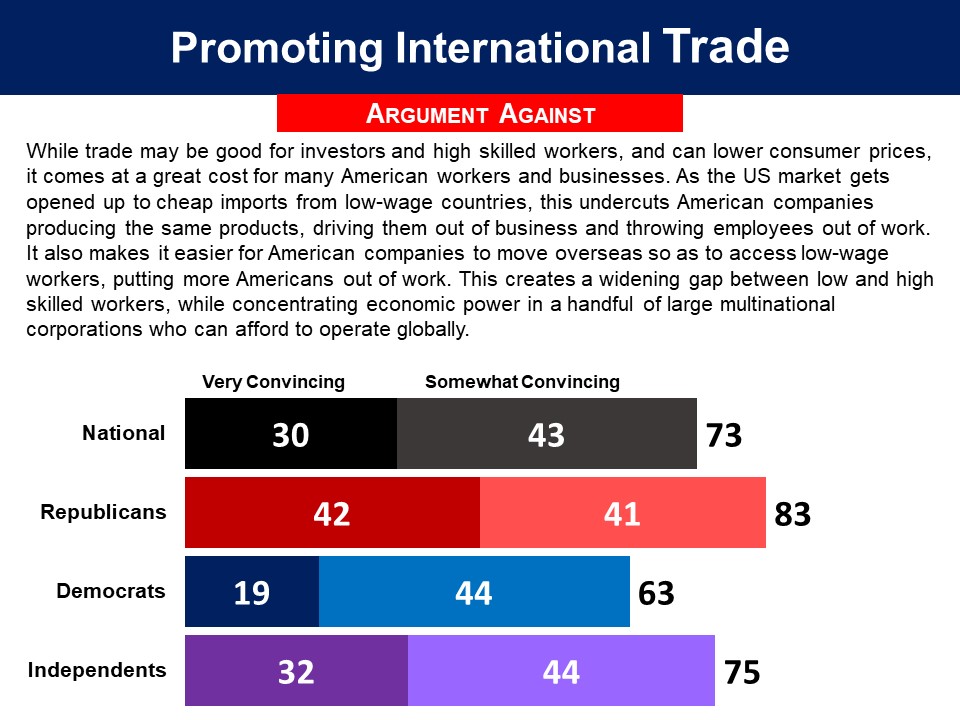 Expanding Access to Markets and Competing with Subsidized Foreign Companies
Expanding Access to Markets and Competing with Subsidized Foreign Companies 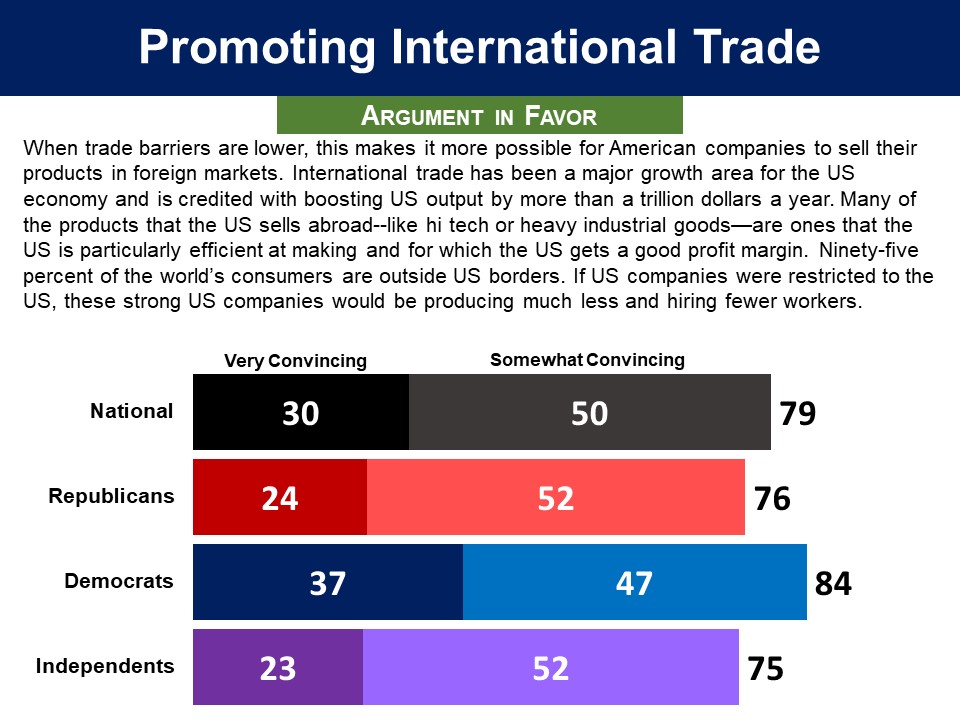
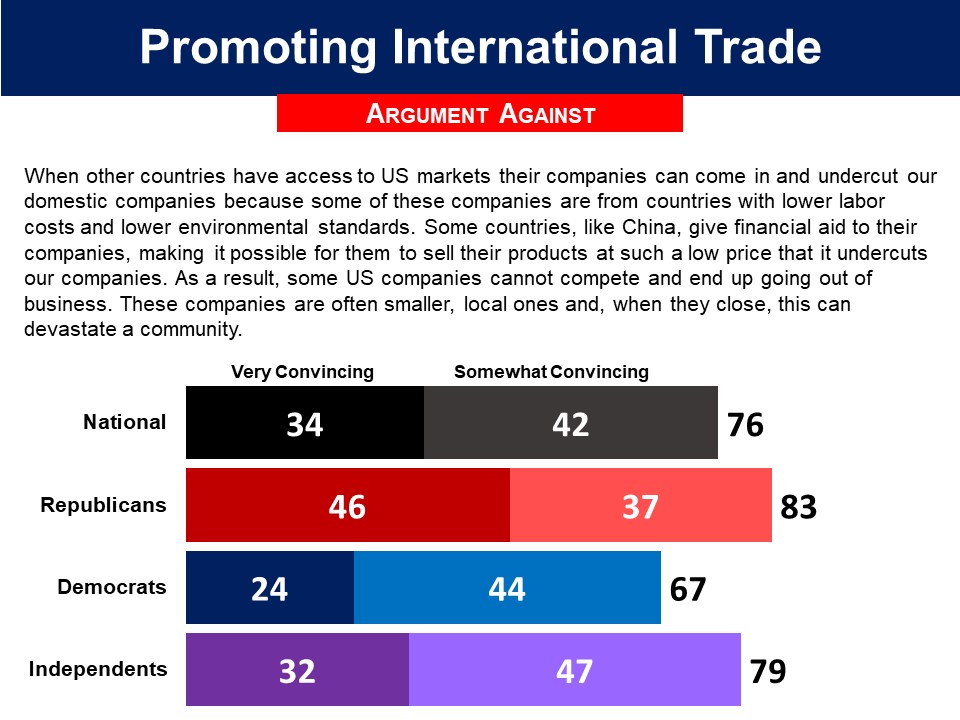
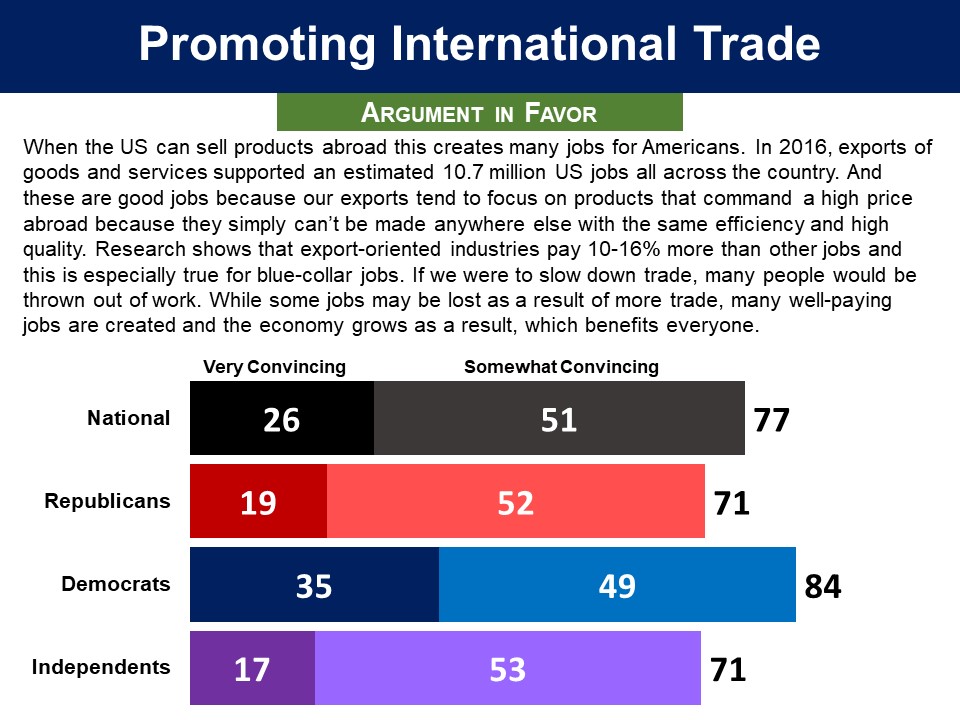
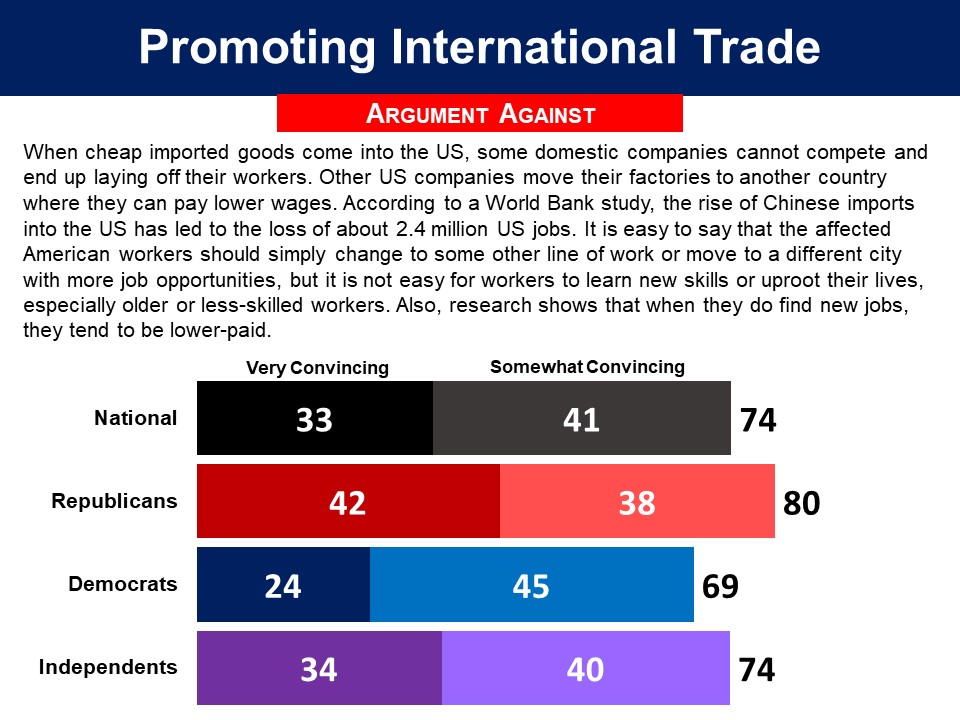 The Value of Engagement and the Threat to Sovereignty
The Value of Engagement and the Threat to Sovereignty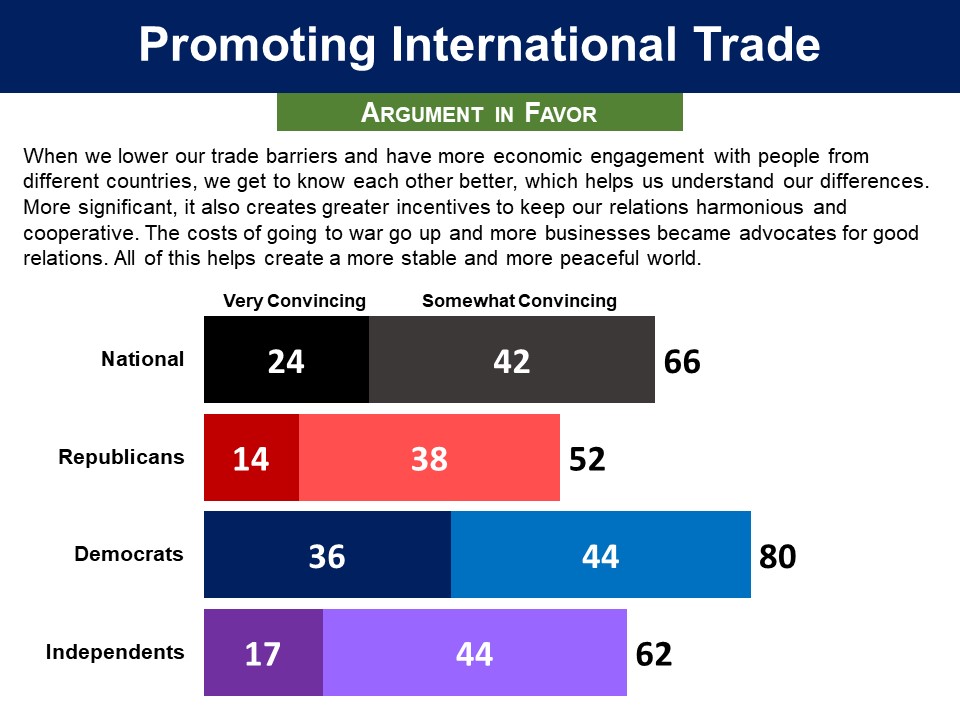

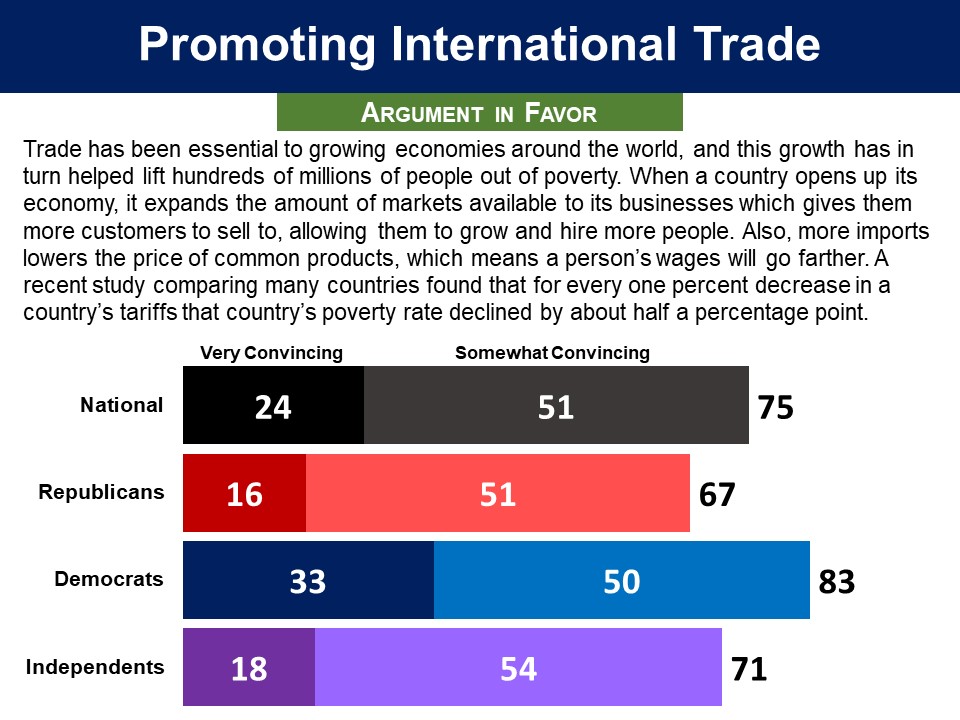
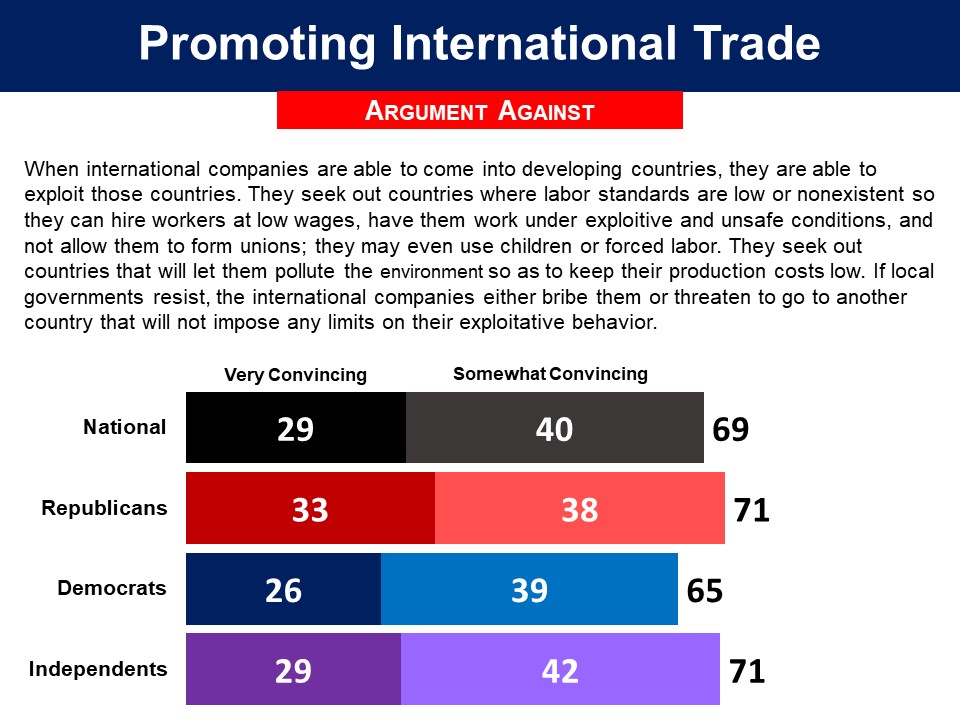 Final Recommendation
Final Recommendation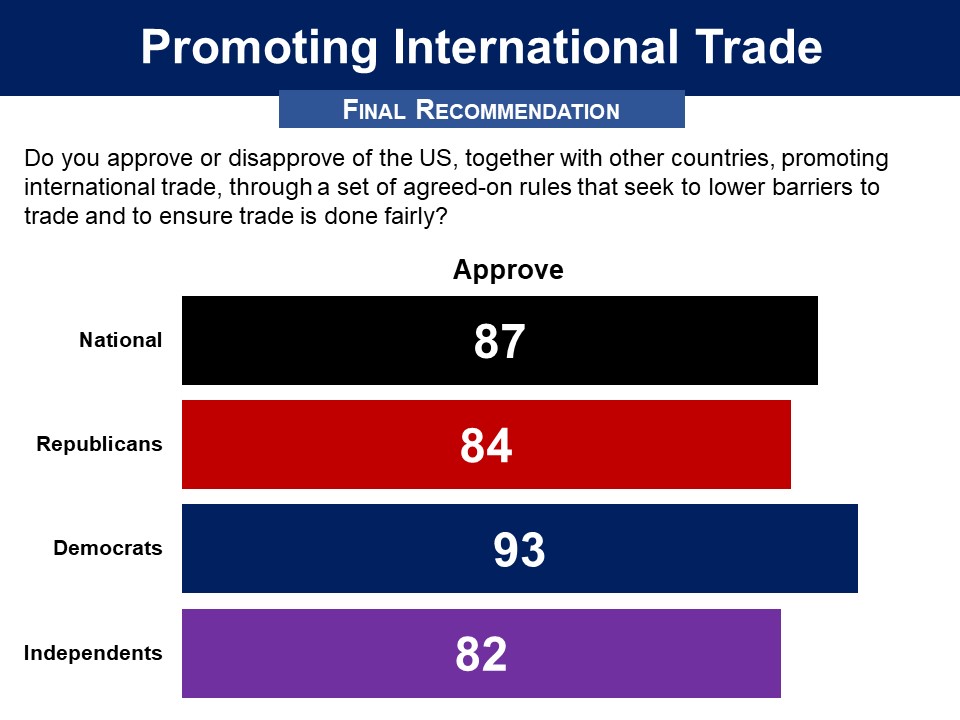
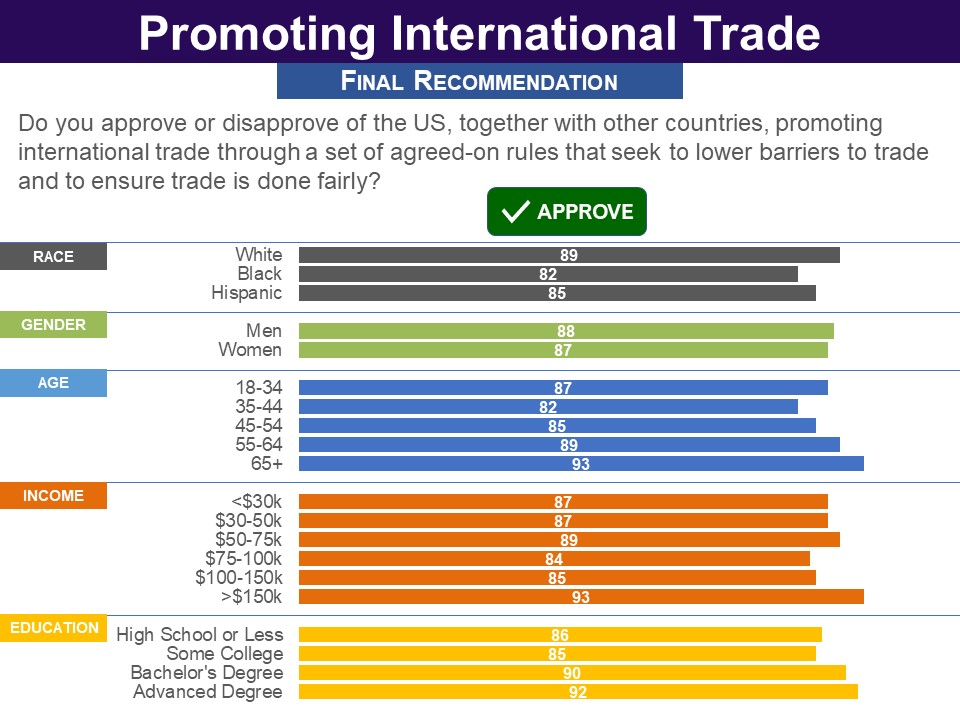




 Related Standard Polls
Related Standard Polls

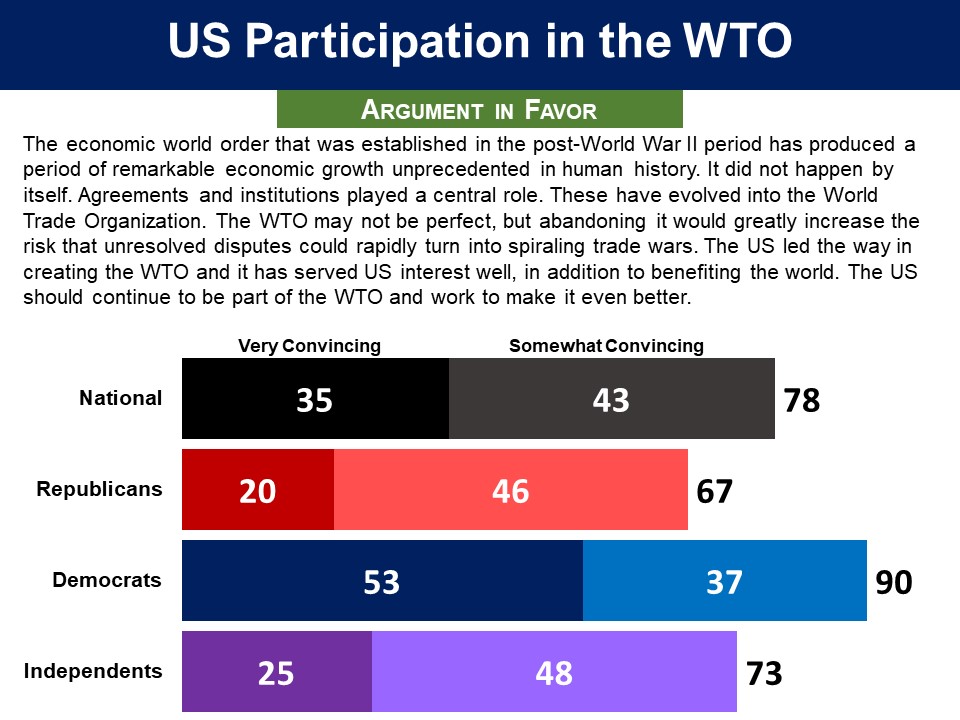
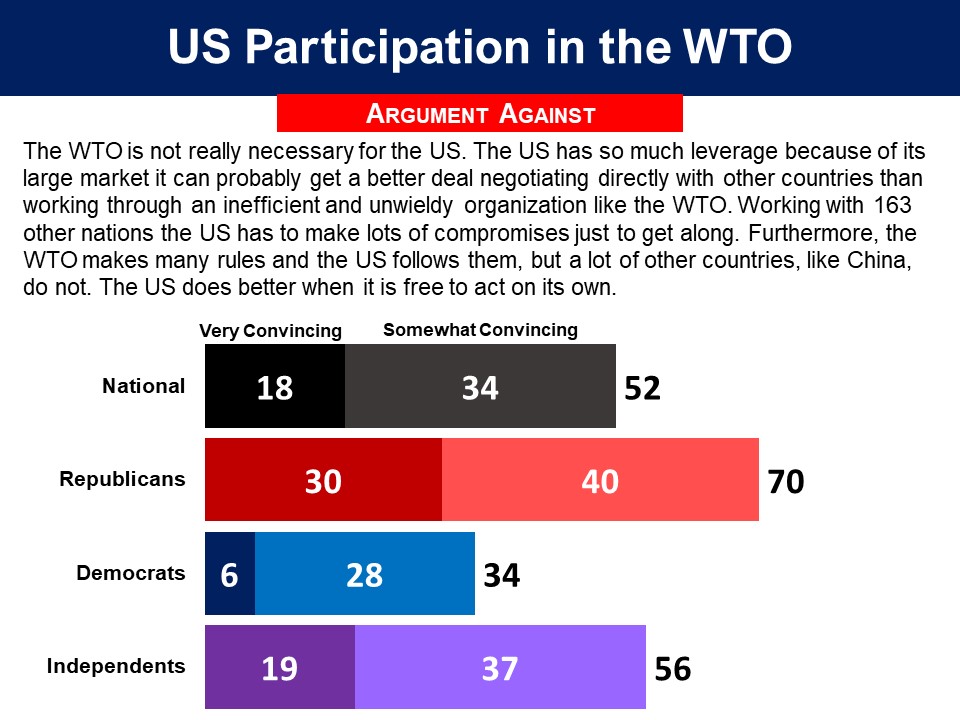 Finally, asked whether they approve or disapprove of the US continuing to be part of the World Trade Organization, 72% approved. However, only a modest majority of Republicans approved (54%) while an overwhelming majority of Democrats (89%) did so.
Finally, asked whether they approve or disapprove of the US continuing to be part of the World Trade Organization, 72% approved. However, only a modest majority of Republicans approved (54%) while an overwhelming majority of Democrats (89%) did so.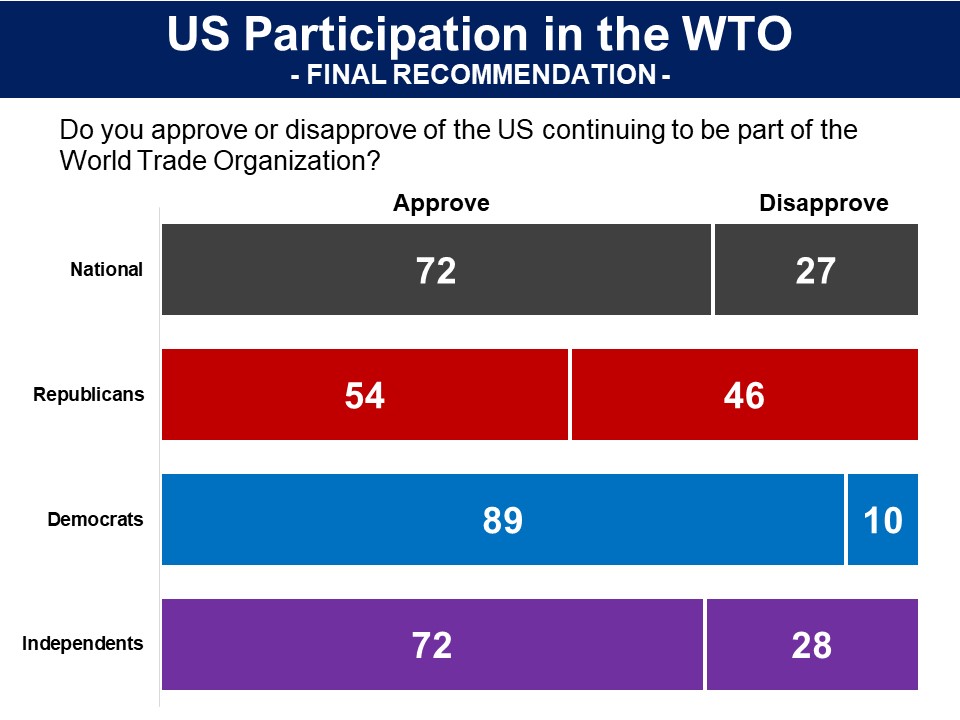
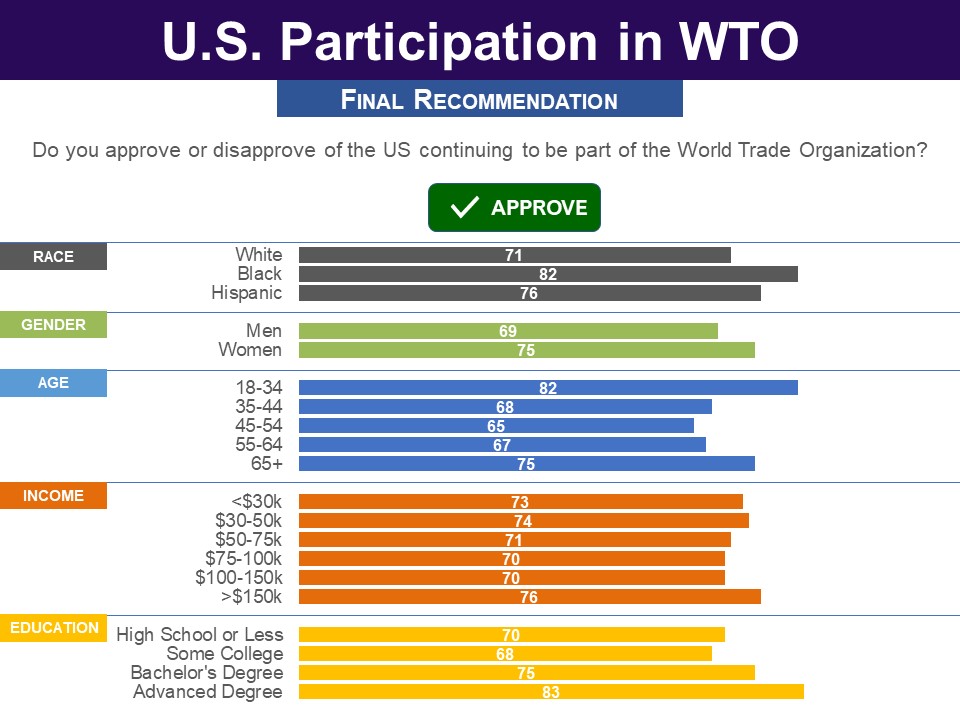


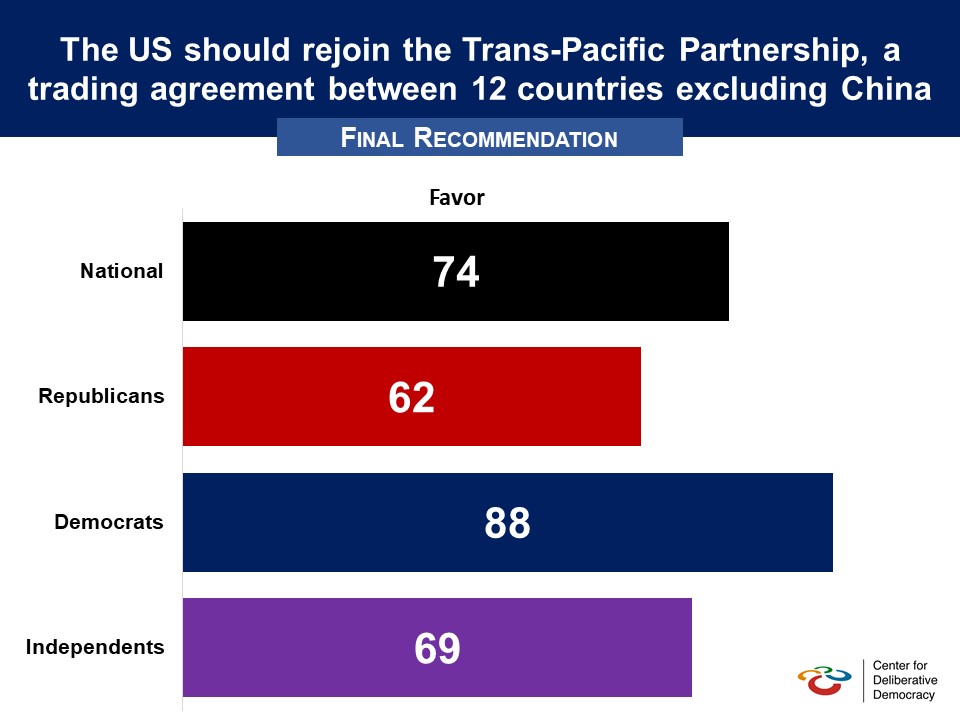 Pre-Deliberation Poll
Pre-Deliberation Poll









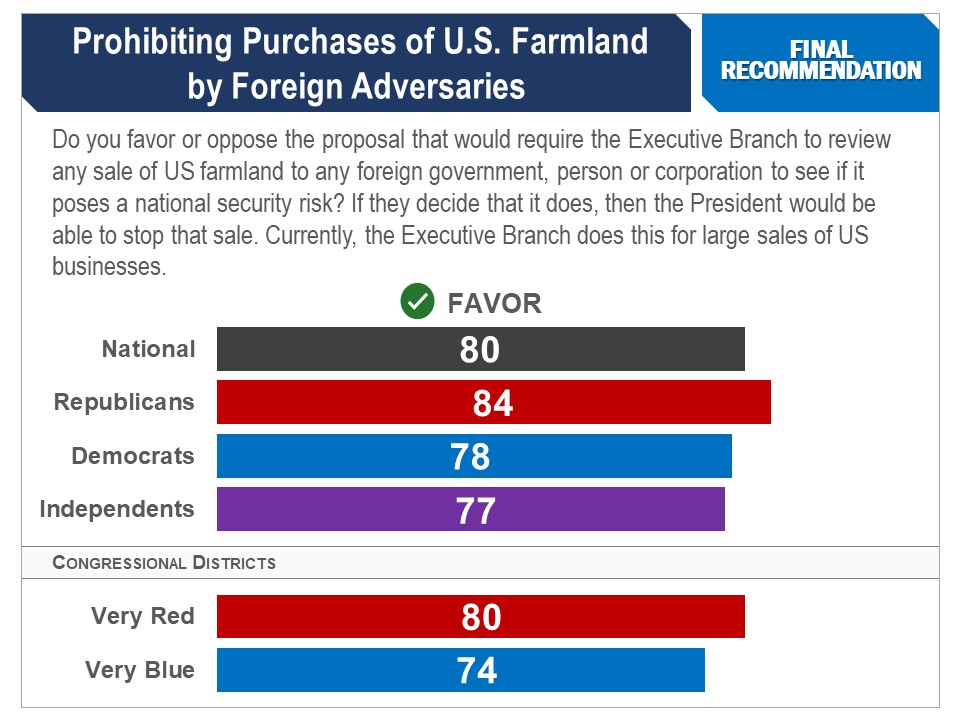






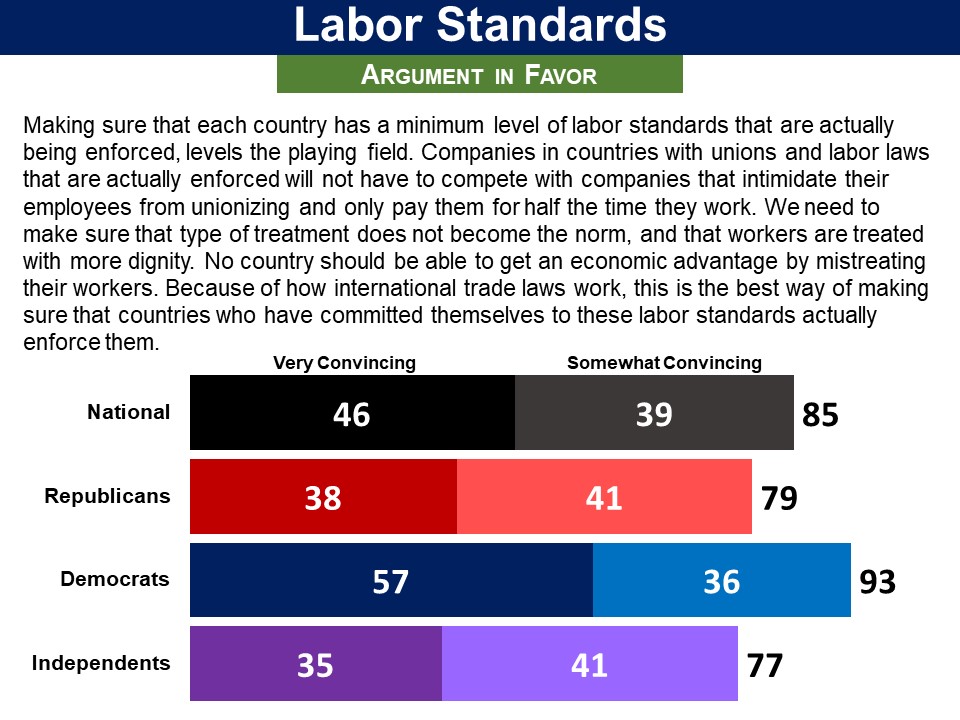
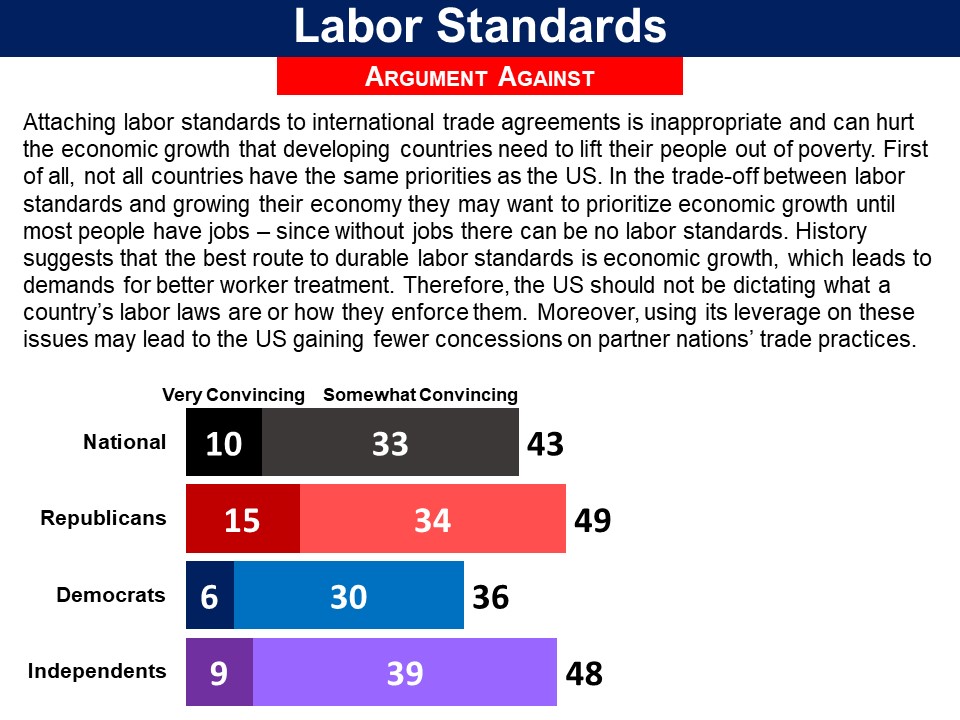
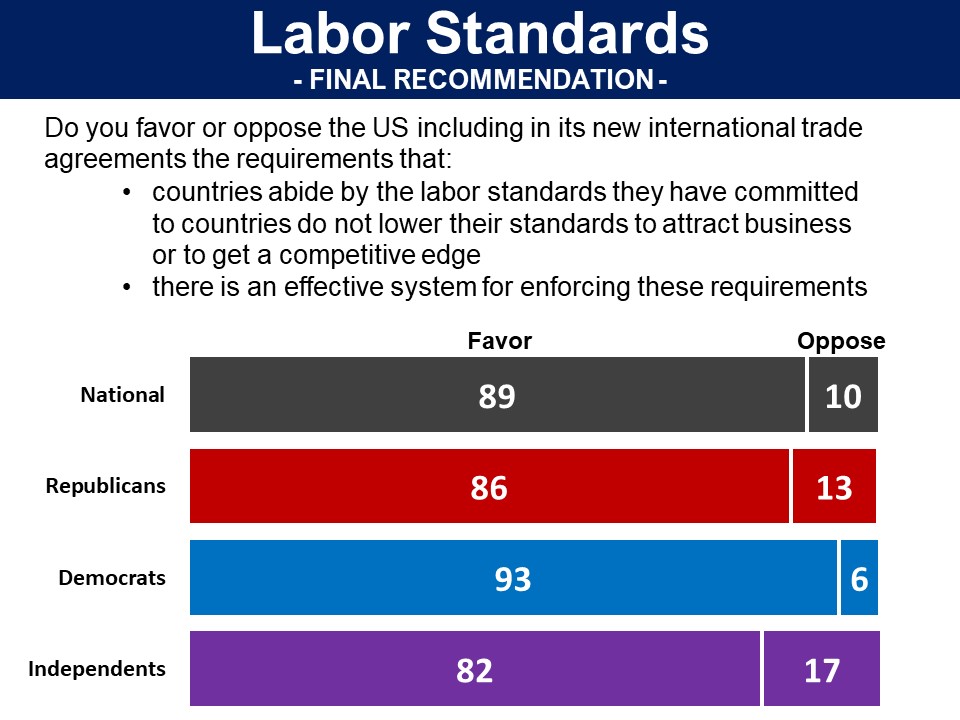
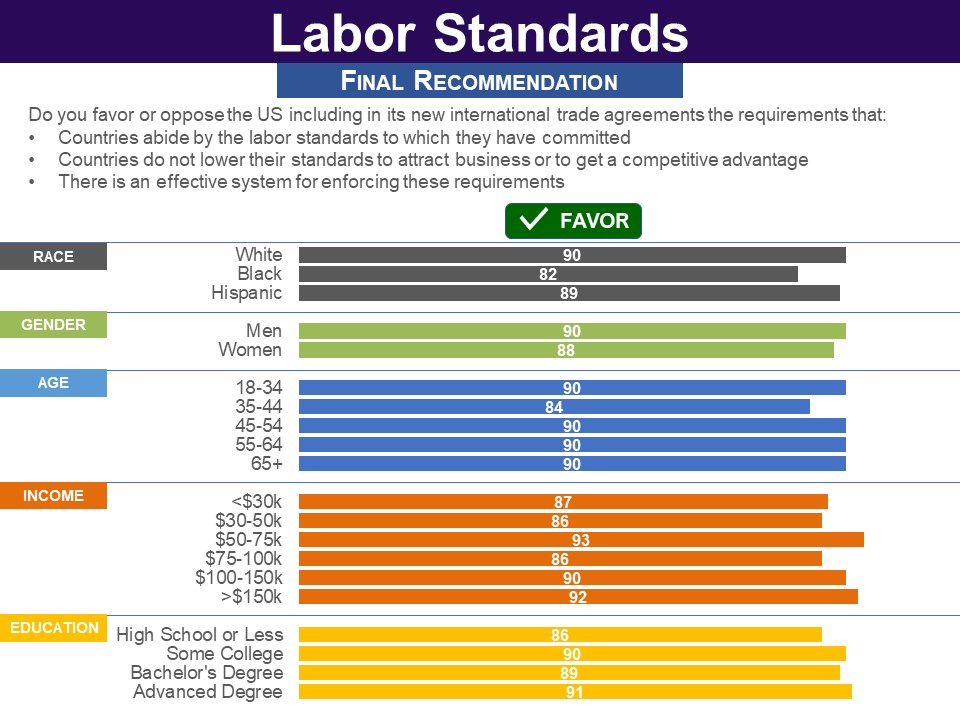


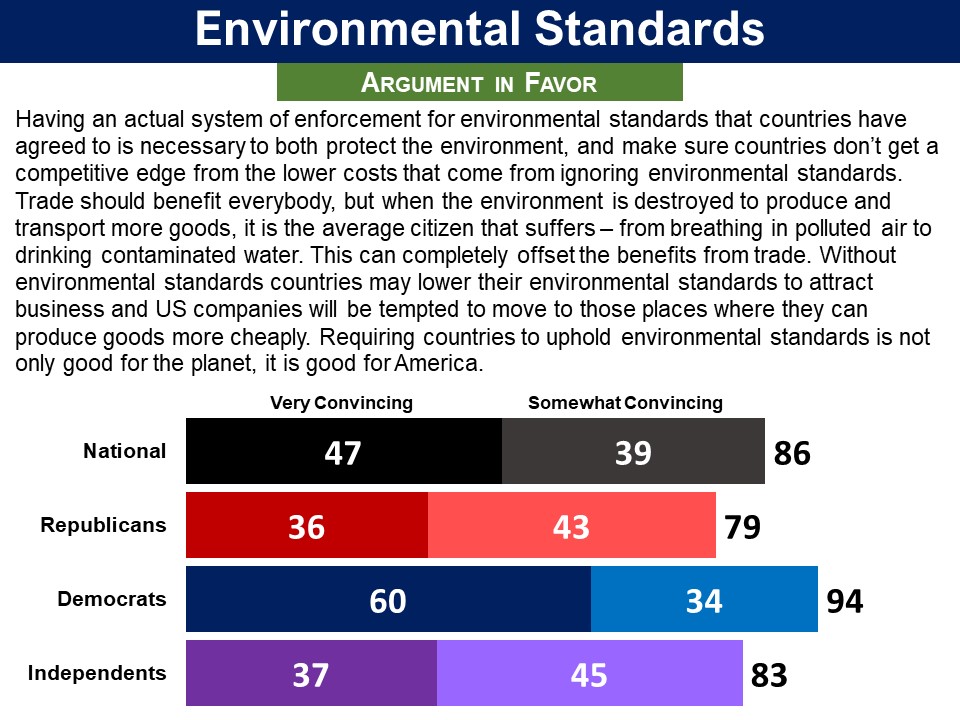
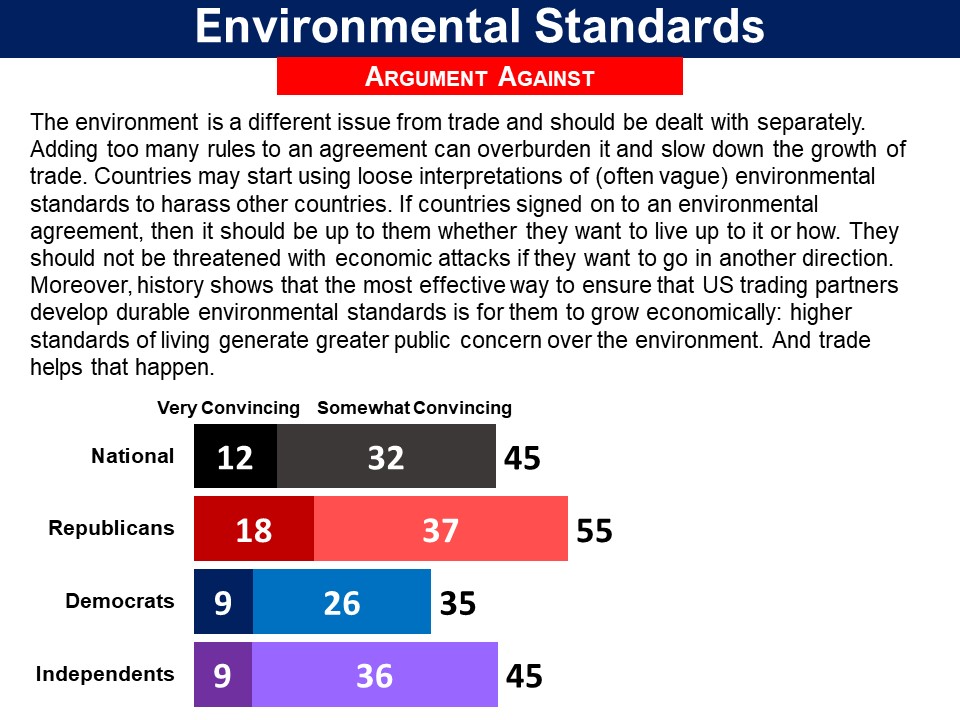 Finally, asked whether they favor or oppose including in new international trade agreements requirements for environmental standards and an effective system for enforcing them, an overwhelming and bipartisan majority were in favor (86%, Republicans 79%, Democrats 94%).
Finally, asked whether they favor or oppose including in new international trade agreements requirements for environmental standards and an effective system for enforcing them, an overwhelming and bipartisan majority were in favor (86%, Republicans 79%, Democrats 94%).